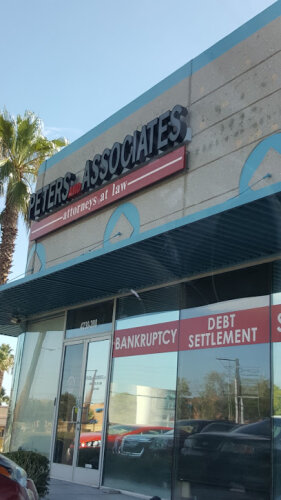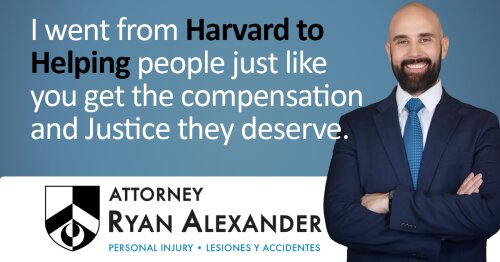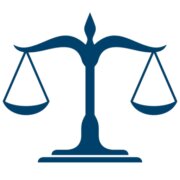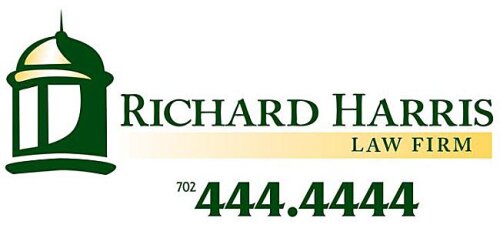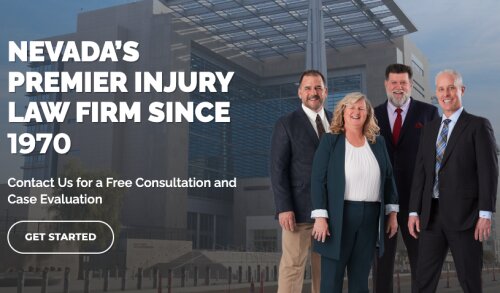Best Property Damage Lawyers in Las Vegas
Share your needs with us, get contacted by law firms.
Free. Takes 2 min.
List of the best lawyers in Las Vegas, United States
United States Property Damage Legal Questions answered by Lawyers
Browse our 1 legal question about Property Damage in United States and read the lawyer answers, or ask your own questions for free.
- MOVING COMPANY DAMAGED RENTAL HOME, FURNITURE AND NEW HOME
- MOVING COMPANY DAMAGED WALLS AND FURNITURE IN TWO HOUSES, THEY DIDNT USED PACKING BLANKETS OR MOVING EQUIPMENT, I FILED A DAMAGE CLAIM MID MOVE, AND RELIEVED THE WORKERS EARLY FROM SCHEDULED TIME TOOK PICS AND SUBMITTED TO THE MOVING COMPANY, NOW THE MOVING COMPANY IS INSINUATING WE CAUSED THE DAMAGE,... Read more →
-
Lawyer answer by T & A Legal
Hello, sorry about the damage to your walls and furniture. The moving company may be liable for a breach of contract or negligence. However, their liability will be determined largely by the contract between you and the moving company.Please note...
Read full answer
About Property Damage Law in Las Vegas, United States
Property damage law covers legal issues that arise when real property or personal property is harmed, destroyed, or devalued. In Las Vegas, property damage matters can come from many sources - vehicle collisions, water leaks, fire, vandalism, construction accidents, defective workmanship, flooding, and landlord-tenant disputes. Cases range from small repair disputes handled in local justice courts to complex litigation involving insurance carriers, contractors, homeowner associations, or government entities. Nevada state law, Las Vegas municipal codes, and Clark County regulations all play a role in defining rights, duties, deadlines, and remedies.
Why You May Need a Lawyer
Not every property damage problem requires a lawyer, but legal assistance can be important when:
- The amount of damage is large or the cost of repairs is disputed.
- An insurance claim is denied, partially paid, delayed, or undervalued by the insurer.
- The cause of damage is disputed or multiple parties may share fault.
- A landlord, neighbor, contractor, or association refuses to fix damage or refuses to reimburse you.
- You face substandard repairs or suspect contractor fraud, unlicensed work, or bad faith dealing.
- You need to preserve time-sensitive rights, such as filing deadlines, or to obtain emergency relief like injunctions or court-ordered repairs.
- The opponent threatens litigation or files suit and your exposure could be monetary or possessory.
Local Laws Overview
Key legal frameworks and local authorities that affect property damage matters in Las Vegas include:
- Nevada Revised Statutes: State statutes govern civil liability, tort claims, insurance regulations, landlord-tenant duties, and procedures for filing lawsuits. Certain statutory chapters address homeowner association law, contractor licensing, and consumer protections.
- Las Vegas Municipal Code and Clark County Code: Local codes set standards for building safety, property maintenance, nuisance abatement, and emergency orders. Code enforcement can order repairs or fines when property creates a public-health or safety hazard.
- Insurance law and regulation: The Nevada Division of Insurance regulates insurer conduct and licensing. Insurance policies and Nevada law together determine what losses are covered, policy limits, exclusions, and insurer duties such as prompt investigation and payment.
- Contractor licensing and consumer protections: The Nevada State Contractors Board regulates contractors, licensing, and complaints about construction work. Using licensed contractors and keeping written contracts helps protect homeowners.
- Court placement and procedures: Small-dollar disputes may be handled in local justice courts or small-claims forums. Larger or more complex disputes typically proceed in Nevada district courts. Alternative dispute resolution - mediation and arbitration - is common in construction and insurance disputes.
Frequently Asked Questions
What counts as property damage?
Property damage includes physical harm to real property (homes, buildings, fences) and personal property (vehicles, appliances, furniture) that reduces value or function. Damage can be sudden and accidental - like a burst pipe or collision - or gradual - like long-term water intrusion or encroachment. Whether a particular loss qualifies for recovery depends on legal cause, insurance terms, and proof of loss.
How do I start an insurance claim for property damage?
Report the loss to your insurer as soon as possible, provide accurate details, and preserve evidence. Take photos, inventory damaged items, keep receipts for emergency repairs, and document communications with adjusters. Read your policy for required notice periods and cooperating provisions. If you face a denial or low offer, consider having a contractor or public adjuster estimate repairs and consult an attorney.
What if a neighbor or contractor damaged my property?
If a neighbor or contractor caused the damage, try to document the facts and communicate your expectations in writing. If they are insured, you may pursue their insurance. For contractor problems, check the Nevada State Contractors Board for licensing and complaint options. If informal resolution fails, you may negotiate a settlement, seek mediation, or file a civil lawsuit.
How important is documentation and evidence?
Documentation is critical. Take dated photos and video, collect repair estimates, save invoices and receipts, get witness statements, and preserve the scene where feasible. Official reports - police, fire, or building department reports - strengthen claims. Good records help prove liability, causation, and damages, and make claims easier to settle or litigate.
What deadlines should I be aware of?
Various deadlines apply - insurance policy notice requirements, administrative deadlines for government entities, and statutory limitation periods for filing lawsuits. Deadlines vary by claim type and governing law. Acting promptly preserves evidence and reduces the risk of losing legal rights, so consult a lawyer early if you are unsure.
Can I handle a small damage claim myself?
For minor losses, you may handle a claim directly with an insurer or in small-claims court if the dollar amount fits local limits. Preparation - documentation, estimates, and a clear demand letter - can help. For disputes involving complex liability, significant reconstruction, or aggressive insurers or defendants, legal help is often advisable.
What is my financial exposure if I sue or get sued?
If you sue for property damage you generally seek compensation for repair costs, diminished value, and related losses. If you are sued for causing damage, potential exposure includes repair costs, consequential losses, and possibly punitive damages in rare cases of intentional or malicious conduct. A lawyer can explain likely damages and risks in your situation.
How do homeowner associations affect property damage claims?
HOAs have governing documents and statutory duties under state law that affect maintenance, common-area repairs, and responsibility for damage. Disputes with an HOA may involve internal procedures, demand letters, and statutory notice requirements before litigation. Knowing the association rules and state HOA law helps determine who pays and whether an HOA can be compelled to act.
When should I consider hiring a lawyer?
Consider a lawyer when the damage is substantial, parties dispute fault, an insurer acts in bad faith, the other side refuses reasonable settlement, or legal deadlines approach. Attorneys experienced in property damage can evaluate liability, quantify losses, negotiate with insurers or opposing counsel, and, if needed, file suit and manage litigation or alternative dispute resolution.
How do I find the right property damage attorney in Las Vegas?
Look for attorneys with experience in property damage, insurance claims, construction law, or landlord-tenant matters depending on your issue. Ask about case experience, fee structures, typical outcomes, and client references. Confirm the lawyer is licensed in Nevada and ask if they offer a free or low-cost initial consultation. The State Bar of Nevada has referral resources for finding attorneys.
Additional Resources
Useful local and state resources to consult or contact include:
- Nevada Division of Insurance - for questions about insurer conduct and licensing enforcement.
- Nevada State Contractors Board - to verify contractor licenses and file complaints about construction work.
- City of Las Vegas Code Enforcement and Clark County Code Enforcement - for nuisance, building code, and property maintenance issues.
- Clark County Department of Building and Fire Prevention - for building permits, inspections, and post-loss structural safety.
- Nevada Attorney General - consumer protection and complaint resources for bad faith or deceptive practices.
- State Bar of Nevada - lawyer referral and information on finding local counsel.
- Local justice courts and district courts - for filing claims and understanding court procedures. Also check for local small-claims guidance and monetary limits.
- Community legal aid organizations - for low-income residents who need free or reduced-fee legal help in civil matters.
Next Steps
Follow these practical steps if you have property damage and need legal assistance:
1. Secure safety and prevent further damage - take reasonable emergency measures to protect property and document any emergency repairs with receipts and photos.
2. Document thoroughly - photograph and videotape damage, collect witness names, keep written records of all communications, and preserve physical evidence.
3. Notify your insurer and other responsible parties quickly - follow policy notice requirements and keep copies of all correspondence.
4. Get estimates - obtain multiple written repair estimates and keep invoices for emergency work.
5. Check local resources - contact the Nevada Division of Insurance, the Nevada State Contractors Board, and local code enforcement when appropriate.
6. Consider negotiation or mediation - many disputes settle without litigation. A demand letter from an attorney can prompt resolution.
7. Consult a licensed Nevada attorney - if the loss is large, liability is disputed, insurance issues arise, or legal deadlines exist, speak with an attorney promptly to preserve rights and plan next steps.
8. Keep organized records - maintain a single file for all documents, photos, estimates, receipts, and correspondence related to the claim.
Remember that this guide provides general information and not legal advice. For advice specific to your circumstances, consult a licensed attorney in Nevada who can analyze the facts, explain applicable laws and deadlines, and recommend tailored options.
Lawzana helps you find the best lawyers and law firms in Las Vegas through a curated and pre-screened list of qualified legal professionals. Our platform offers rankings and detailed profiles of attorneys and law firms, allowing you to compare based on practice areas, including Property Damage, experience, and client feedback.
Each profile includes a description of the firm's areas of practice, client reviews, team members and partners, year of establishment, spoken languages, office locations, contact information, social media presence, and any published articles or resources. Most firms on our platform speak English and are experienced in both local and international legal matters.
Get a quote from top-rated law firms in Las Vegas, United States — quickly, securely, and without unnecessary hassle.
Disclaimer:
The information provided on this page is for general informational purposes only and does not constitute legal advice. While we strive to ensure the accuracy and relevance of the content, legal information may change over time, and interpretations of the law can vary. You should always consult with a qualified legal professional for advice specific to your situation.
We disclaim all liability for actions taken or not taken based on the content of this page. If you believe any information is incorrect or outdated, please contact us, and we will review and update it where appropriate.



